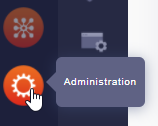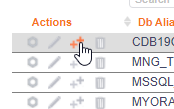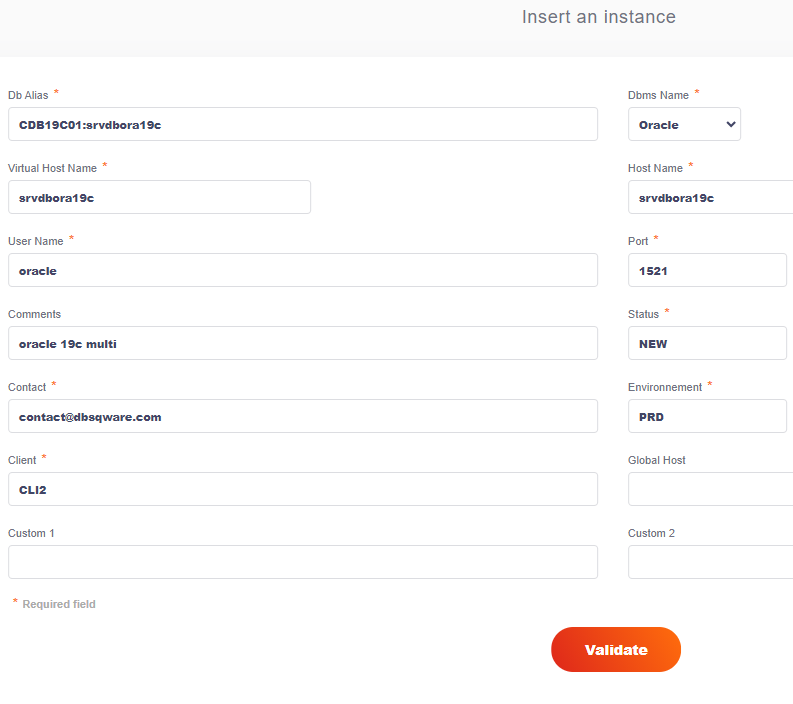FAQ:NewInstanceOracle
Generalties
In this chapter, we will consider that SQWareCentral has been installed on dbsqware@sqwarebox.
Limitations of this section
This chapter only deals with adding a new instance to a base that is already configured and functional.
Use the portions that apply to your environment, and choose either the automatic or manual method as desired
General operating procedure for integrating a new Oracle instance
There will potentially be 1 or 2 connection cases to process
- "local" for Unix machines (or those with Cygwin) where a "/ as sysdba" will be performed on the machine hosting the instance (via SSH connection from dbsqware@sqwarebox)
- "Distant", for generating AWRs (if needed), or in cases where SSH access to the machine is not available (Windows, RDS, etc.)
Classic steps:
- Setting up the environment
- Checking system prerequisites for the "local" part (bash + rsync)
- Manual tests
- Deployment of the instance
You will see that these steps can be handled one by one or in batches!
Integration of an Oracle instance
Setting up the environment
General
Explanation of "DbAlias" (the unique dbSQWare key)
The dbSQWare key must be unique and consistent with what has been configured for the gvsqw_DbAlias variable in sqwora_GlobalVar.cfg!
There are more or less 3 cases...
- Your environment is "standalone" and your ORACLE_SID are unique across the entire environment => gvsqw_DbAlias='$ORACLE_SID'
- Your environment is "standalone" but you have "duplicates" of ORACLE_SID => gvsqw_DbAlias='$ORACLE_SID:$(hostname|cut -d '.' -f1)'
- You have RAC and/or DG => gvsqw_DbAlias='$gvsqw_DB_UNIQUE_NAME:$gvsqw_HOST_UNIQUE_NAME' (gvsqw_DB_UNIQUE_NAME, remove the node number!)
+ any other case that might occur or that "suits you"!
Explanation of statuses
- An "open" instance will be handled in "local" mode, meaning we will connect via "/ as sysdba" locally on the machine hosting the instance (ssh access from dbsqware@sqwarebox), status "ON".
- A "closed" instance, like dataguard, will be handled in "local" mode, meaning we will connect via "/ as sysdba" locally on the machine hosting the instance (ssh access from dbsqware@sqwarebox), status "DG".
- An instance where we don’t have local unix access will be managed in "remote" mode (like Windows, RDS, ...), status "DIST".
- The "OFF" status makes the instance "disappear" from the web view.
- The "NEW" status is used as an intermediate status between the beginning and the end of setting up a new instance.
- All other statuses allow the instance to be displayed in the repository (especially "KEEP") but will not be taken into account by the automatic processes.
Resume of statuses :
| Status | Description |
| ON | locale under Unix (the most common) |
| DIST | remote-only management |
| KEEP | temporary status, during maintenance for example or before complete deletion |
| NEW | temporary status, during configuration |
| OFF | visual removal of the instance (without deleting its configuration) |
| XXX | not supported... |
Instance declaration in SQWareRepository with SQWareWeb
We will declare the new instance from the SQWareWeb administration interface.

Declare the new instance with the status "NEW" (Add or Duplicate).



Explanation of the fields :
| Fields | Description |
| Db Alias | Unique key that identifies the instance in dbSQWare (will be used as SERVICE_NAME for generating the tnsname.ora, for the part before the ":" if present). |
| Dbms Name | Type of SGBD |
| Virtual Host | Virtual host (same as Host if not a cluster, will be used for generating the tnsname.ora). |
| Host Name | Hostname of the instance |
| User Name | User associated with the instance |
| Port | Listening port of the instance (will be used for generating the tnsname.ora). |
| Comments | A brief description of what the instance hosts |
| Status | Instance status (see above for explanations). |
| Contact | A contact if needed |
| Environnement | Instance environment (PRD, PPR, REC, DEV, TST, ...) |
| Client | Used only for filtering (enter a client name and/or department and/or service...) |
| GlobalHost | Free field in which the hypervisor host is often entered, for example. |
| Custom1 | Free field 1 |
| Custom2 | Free field 2 |
Regenerate the reference files of SQWareCentral.
Type the following command which will generate the reference files:
# From : dbsqware@sqwarebox
gen_all
Specific procedure for the "local" part (status ON)
/!\ Only instances that will be in the "ON" status !
Verification of system prerequisites for the "local" part (bash + rsync)
Since SQWareProduction is mainly written in bash shell and synchronized from SQWareCentral using rsync, we therefore need "bash" and "rsync" to be installed !
Verification
Adapt to your username and machine name.
bash:
# From : oracle@my_oracle_host
type bash
#or
which bash
rsync:
# From : oracle@my_oracle_host
type rsync
#or
which rsync
Installation
Adapt to your machine type (use sudo if you are not root).
RedHat / CentOS / ... :
# From : root@my_oracle_host
yum install -y bash rsync
#or
dnf install -y bash rsync
Ubuntu / Debian / ... :
# From : root@my_oracle_host
apt install -y bash rsync
Deployment of SSH key(s) from SQWareCentral to the target machine(s)
There are two ways to proceed:
- An automatic one (from dbsqware@sqwarebox, but it requires you to know the password of the oracle Unix account)
- A manual one that you apply on each oracle Unix account
/!\ The password of your oracle Unix account must have been initialized, otherwise key-based authentication will not work!
Deployment of SSH key(s): batch method
# From : dbsqware@sqwarebox
menu_ora GenDeplSshKeys_SQWareCentral GenLstInstanceNew
Verify that this is indeed the list you want to deploy, then choose option 1 ...
=> Enter the Unix password when prompted !
Deployment of SSH key(s): manual method
# From : oracle@my_oracle_host
if [ ! -r $HOME/.ssh/id_rsa ]
then
ssh-keygen -t rsa -N ''''''' -f $HOME/.ssh/id_rsa
fi
chmod go-w $HOME
echo "ssh-rsa AAAAB......XSPpdV11 dbsqware@sqwarebox" >>$HOME/.ssh/authorized_keys
chmod 700 $HOME/.ssh
chmod 600 $HOME/.ssh/authorized_keys
=> Put the correct key in the "echo" (the one from dbsqware@sqwarebox)
SSH connection test from SQWareCentral
# From : dbsqware@sqwarebox
menu_ora TestSshConnection GenLstInstanceNew
Test of prerequisites on the target host (bash+rsync) via SSH from SQWareCentral
# From : dbsqware@sqwarebox
menu_ora TestSysPrerequisites GenLstInstanceNew
Deployment of SQWareProduction
# From : dbsqware@sqwarebox
#If deployment on "unique" user
menu_ora DeplScripts GenLstUniqueNew
#If deployment on "instance" user, the one specified in SQWareRepository
menu_ora DeplScripts GenLstInstanceNew
For "unique" user, it is the "standard" user. By default, we set it to "oracle", and it can be modified in SQWareCentral.
Adding the dbSQWare environment to ~/.profile or ~/.bash_profile
Once again, there are two ways to proceed:
- An automatic one (from dbsqware@sqwarebox)
- A manual one that you apply on each oracle Unix account
Adding the dbSQWare environment: batch method
# From : dbsqware@sqwarebox
menu_ora AdddbSQWareProfile GenLstInstanceNew
Check that this is indeed the list you want to deploy, then choose 1 ...
=> In ~/.profile or ~/.bash_profile, change the following variable with the appropriate value: gvsqw_Env='XXX'
Adding the dbSQWare environment: manual method
Add the following lines to ~/.profile or ~/.bash_profile
# From : oracle@my_oracle_host
#dbSQWare
export gvsqw_OraBin=$HOME/SQWareProduction/oracle/bin
export gvsqw_Env='PRD'
lvsqw_IsTerminal=$(tty 2>&1 >/dev/null;echo $?)
if [ "$lvsqw_IsTerminal" = "0" ] && [ -r $gvsqw_OraBin/../etc/.profile_confort ]
then
. $gvsqw_OraBin/../etc/.profile_confort
fi
Test sendmail (Non mandatory)
# From : dbsqware@sqwarebox
menu_ora TestSendmail GenLstInstanceNew
Manual connection test to the Oracle instance
The goal is to test the automatic connection methods to the Oracle instance.
- "local", for instances that will be in "ON" status
- "remote", to generate AWR (possibly) or for cases where there is no SSH access to the machine (Windows, RDS, etc...)
Test connection "local"
/!\ Only instances that will be in "ON" status!
# From : dbsqware@sqwarebox
menu_ora TestInstConnectionOnNoMail GenLstInstanceNew
Specific procedure for the AWR or RAC part
Creation of a specific dbSQWare Oracle account
Example of creation order (NON-CDB) :
CREATE USER DBSUSER
IDENTIFIED BY "DoNotSetThisPassword!"
PROFILE DEFAULT
ACCOUNT UNLOCK;
GRANT RESOURCE TO DBSUSER;
GRANT CONNECT TO DBSUSER;
--GRANT DBA TO DBSUSER;
ALTER USER DBSUSER DEFAULT ROLE ALL;
GRANT SELECT ANY DICTIONARY TO DBSUSER;
GRANT EXECUTE ON DBMS_WORKLOAD_REPOSITORY TO DBSUSER;
Example of creation order (CDB) :
CREATE USER C##DBSUSER
IDENTIFIED BY "DoNotSetThisPassword!"
PROFILE DEFAULT
ACCOUNT UNLOCK CONTAINER=ALL;
GRANT RESOURCE TO C##DBSUSER CONTAINER=ALL;
GRANT CONNECT TO C##DBSUSER CONTAINER=ALL;
--GRANT DBA TO C##DBSUSER CONTAINER=ALL;
--GRANT SYSDBA TO C##DBSUSER CONTAINER=ALL;
ALTER USER C##DBSUSER DEFAULT ROLE ALL CONTAINER=ALL;
GRANT SELECT ANY DICTIONARY TO C##DBSUSER CONTAINER=ALL;
GRANT EXECUTE ON DBMS_WORKLOAD_REPOSITORY TO C##DBSUSER CONTAINER=ALL;
You can set the username and password you want!
This account must be declared on the unix account oracle@sqwarebox ...
If a specific entry is found, it will be used; otherwise, the "DEFAULT" entry will be used.
oracle@sqwarebox:/home/oracle (NoSID) $ cat .passwd_oracle
DEFAULT;DBSUSER;DoNotSetThisPassword!
SPECIFIC_ORA;system;manager
Test "remote" connection
/!\ Only for AWR and RAC
# From : dbsqware@sqwarebox
menu_ora TestInstConnectionDistNoMail GenLstInstanceNew
Deployment of the instance
Generation of the default SQWareProduction configuration
/!\ Only instances that will be in "ON" status!
# From : dbsqware@sqwarebox
menu_ora GenDefConf_SQWareProduction GenLstInstanceNew
Update of SQWareRepository
In the dbSQWare repository via the administration console, update the status of the new Oracle instance (currently set to NEW) with the desired value (ON, DG, DIST)
Test of "recovery" of indicators
At this point, you can test the recovery of missing indicators (in principle, only the instances you have just integrated!)
# From : dbsqware@sqwarebox
## Only for status "ON"
repind_ora
## Only for status "DIST"
repind_ora_dist
## Only for status "DG"
repind_ora_dg
Exploitation (backups, …) for "ON" instances
Generation of SQWareProduction configs
If you followed the procedure for inserting the instance, this part has already been done by the "menu_ora GenDefConf_SQWareProduction GenLstInstanceNew" step.
You can verify with the following chapter.
Connect to the machine hosting the "Oracle" instance and type the following commands:
# From dbsqware@vorawarebox
c ORADBS
#Load the environment if running in multi-instance mode (from oracle@my_oracle_host)
e ORADBS
too
./sqwora_GenerateCreateInstance.ksh -dbsOnly
Verify that the proposed configuration is correct and type "y" if it is.
At this point, you have generated the default configuration files for SQWareProduction.
RMAN Configuration
If you wish to set up RMAN backups, you will need to:
Be in archivelog mode if you want to perform hot backups
Have configured the RMAN settings (dbSQWare is based on the retention period and the DISK/SBT_TAPE type configured)
Have configured $HOME/admin/ORADBS/sqwConfig/sqwora_Rman.cfg (which determines the behavior of sqwarchmon and whether or not a catalog is used)
Configuration verification:
vi $HOME/admin/ORADBS/sqwConfig/sqwora_Rman.cfg
Verification of archiving:
sqlplus '/ as sysdba'
select log_mode from v$database;
LOG_MODE
------------
ARCHIVELOG
show parameters log_archive_format;
NAME TYPE VALUE
------------------------------------ ----------- ------------------------------
log_archive_format string ORADBS_redo_%t_%s_%r.arc
show parameters log_archive_dest_1;
NAME TYPE VALUE
------------------------------------ ----------- ------------------------------
log_archive_dest_1 string LOCATION=/orabackup/ORADBS/archive MANDATORY
If needed, change the settings:
alter system set log_archive_format='ORADBS_redo_%t_%s_%r.arc' scope=spfile;
alter system set log_archive_dest_1='LOCATION=/orabackup/ORADBS/archive/ MANDATORY';
If needed, set the database to ARCHIVELOG:
shutdown immediate;
startup mount;
alter database archivelog;
alter database open;
"Minimal" RMAN configuration (based on the default settings) :
too
./sqwora_RmanConfigure.ksh
Verification of RMAN configuration :
rman target / RMAN> show all; using target database control file instead of recovery catalog RMAN configuration parameters for database with db_unique_name ORADBS are: CONFIGURE RETENTION POLICY TO RECOVERY WINDOW OF 6 DAYS; CONFIGURE BACKUP OPTIMIZATION ON; CONFIGURE DEFAULT DEVICE TYPE TO DISK; # default CONFIGURE CONTROLFILE AUTOBACKUP OFF; CONFIGURE CONTROLFILE AUTOBACKUP FORMAT FOR DEVICE TYPE DISK TO '/orabackup/ORADBS/rman/autobackup/%F'; CONFIGURE DEVICE TYPE DISK PARALLELISM 4 BACKUP TYPE TO BACKUPSET; CONFIGURE DATAFILE BACKUP COPIES FOR DEVICE TYPE DISK TO 1; # default CONFIGURE ARCHIVELOG BACKUP COPIES FOR DEVICE TYPE DISK TO 1; # default CONFIGURE MAXSETSIZE TO UNLIMITED; # default CONFIGURE ENCRYPTION FOR DATABASE OFF; # default CONFIGURE ENCRYPTION ALGORITHM 'AES128'; # default CONFIGURE COMPRESSION ALGORITHM 'BASIC' AS OF RELEASE 'DEFAULT' OPTIMIZE FOR LOAD TRUE ; # default CONFIGURE RMAN OUTPUT TO KEEP FOR 7 DAYS; # default CONFIGURE ARCHIVELOG DELETION POLICY TO NONE; # default CONFIGURE SNAPSHOT CONTROLFILE NAME TO '/home/oracle/admin/ORADBS/sqwConfig/snapcf_ORADBS.f';
If needed, modify RMAN settings :
RMAN> CONFIGURE RETENTION POLICY TO REDUNDANCY 3; old RMAN configuration parameters: CONFIGURE RETENTION POLICY TO RECOVERY WINDOW OF 6 DAYS; new RMAN configuration parameters: CONFIGURE RETENTION POLICY TO REDUNDANCY 3; new RMAN configuration parameters are successfully stored
Explanations
The previous steps have created certain default files. ($HOME/ORADBS/sqwConfig)
#Enter the instance name
e ORADBS
cfg
cat sqwora_Jobs.cfg
#IndicDba: Gather indicators DBAs
IndicDba:$gvsqw_OraBin/sqwora_GatherIndicators.ksh -I ORADBS
#RmanFull: Backup level 0 (full) with RMAN
RmanFull:$gvsqw_OraBin/sqwora_RmanBackup.ksh -I ORADBS -T i0 -Exec
#RmanInc: Backup level 1 (incremental) with RMAN
RmanInc:$gvsqw_OraBin/sqwora_RmanBackup.ksh -I ORADBS -T i1 -Exec
#PurgeAlert: Purge log/trace files
PurgeAlert:$gvsqw_OraBin/sqwora_PurgeAlert.ksh -I ORADBS
#GenAwr: Generate AWR reports
GenAwr:$gvsqw_OraBin/sqwora_GenerateAwr.ksh -I ORADBS
#ExpFull: export full of database
ExpFull:$gvsqw_OraBin/sqwora_Export.ksh -I ORADBS -T full -H 2 -Exec
#ExpdpFull: export full of database (expdp)
ExpdpFull:$gvsqw_OraBin/sqwora_Expdp.ksh -I ORADBS -T full -H 2 -Exec
It is a configuration file used by the script sqwora_RunJob.ksh to execute actions.
File for a default cron $HOME/CrontabRef_ORADBS :
###########################
## mm(0-59) hh(0-23) dd(1-31) MM(0-12) DAY(0-sunday, 1-monday, ...) command
## ORADBS
#Purge alert
00 08 * * 0 bash -c '. $HOME/.profile ORADBS;$gvsqw_OraBin/sqwora_RunJob.ksh -I ORADBS -A PurgeAlert > $HOME/tmp/PurgeAlert_ORADBS.log 2>&1'
#Datapump
00 22 * * 0-5 bash -c '. $HOME/.profile ORADBS;$gvsqw_OraBin/sqwora_RunJob.ksh -I ORADBS -A ExpdpFull > $HOME/tmp/ExpdpFull_ORADBS.log 2>&1'
#Backups
00 23 * * 6 bash -c '. $HOME/.profile ORADBS;$gvsqw_OraBin/sqwora_RunJob.ksh -I ORADBS -A RmanFull > $HOME/tmp/RmanFull_ORADBS.log 2>&1'
00 23 * * 0-5 bash -c '. $HOME/.profile ORADBS;$gvsqw_OraBin/sqwora_RunJob.ksh -I ORADBS -A RmanInc > $HOME/tmp/RmanInc_ORADBS.log 2>&1'
Deployment
Setting up the cron :
mv $HOME/CrontabRef_ORADBS $HOME/CrontabRef
vi $HOME/CrontabRef
crontab $HOME/CrontabRef
crontab -l
Updating the CrontabRef file :
crontab -l > $HOME/CrontabRef
cat $HOME/CrontabRef
Useful commands
Interesting aliases :
e DBALIAS => Load the environment for the instance bin, etc, too ... => To navigate to the standard SQWareProduction directory cbin, cetc, ctoo ... => To navigate to the custom SQWareProduction directory log => logs SQWareProduction rma => Go to the RMAN backup directory dmpdp => Go to the datapump directory
Some script options:
-h => online help -s => online examples -Exec => when present, executes the commands; if not set, only shows the commands without executing them.
Exemples :
oracle@my_oracle_host:$HOME/admin/ORADBS/logs/RmanBackup (ORADBS) $ bin total 164 drwxr-x--- 2 oracle dba 4096 Aug 16 15:50 . drwxr-x--- 15 oracle dba 187 Aug 16 15:50 .. -rwxr-x--- 1 oracle dba 15773 Aug 16 15:50 sqwArchmon -rwxr-x--- 1 oracle dba 15773 Aug 16 15:50 sqwArchmon.ksh -rwxr-x--- 1 oracle dba 2673 Aug 16 15:50 sqwora_ActivateMonitoring.ksh -rwxr-x--- 1 oracle dba 4506 Aug 16 15:50 sqwora_CopyDmpdp.ksh -rwxr-x--- 1 oracle dba 3551 Aug 16 15:50 sqwora_DbmsStats.ksh lrwxrwxrwx 1 oracle dba 36 Jan 2 2022 sqwora_ExecSQL.ksh -> ../../generic/bin/sqwgen_ExecSQL.ksh -rwxr-x--- 1 oracle dba 7284 Aug 16 15:50 sqwora_Expdp.ksh -rwxr-x--- 1 oracle dba 6861 Aug 16 15:50 sqwora_Export.ksh -rwxr-x--- 1 oracle dba 2652 Aug 16 15:50 sqwora_GatherDistantFsSize.ksh -rwxr-x--- 1 oracle dba 3609 Aug 16 15:50 sqwora_GatherIndicators.ksh -rwxr-x--- 1 oracle dba 2545 Aug 16 15:50 sqwora_GatherStructure.ksh -rwxr-x--- 1 oracle dba 3022 Aug 16 15:50 sqwora_GenerateAwr.ksh -rwxr-x--- 1 oracle dba 3812 Aug 16 15:50 sqwora_GenerateStatspack.ksh -rwxr-x--- 1 oracle dba 6120 Aug 16 15:50 sqwora_Impdp.ksh -rwxr-x--- 1 oracle dba 3199 Aug 16 15:50 sqwora_MonitorWithAwr.ksh -rwxr-x--- 1 oracle dba 2877 Aug 16 15:50 sqwora_MonitorWithAwrLastStat.ksh -rwxr-x--- 1 oracle dba 4117 Aug 16 15:50 sqwora_MonitorWithStatspack.ksh lrwxrwxrwx 1 oracle dba 38 Jan 2 2022 sqwora_NetBackup.ksh -> ../../generic/bin/sqwgen_NetBackup.ksh lrwxrwxrwx 1 oracle dba 40 Jan 2 2022 sqwora_ParallelRun.ksh -> ../../generic/bin/sqwgen_ParallelRun.ksh -rwxr-x--- 1 oracle dba 5041 Aug 16 15:50 sqwora_PartialRefresh.ksh -rwxr-x--- 1 oracle dba 2707 Aug 16 15:50 sqwora_PhysicalColdBackup.ksh -rwxr-x--- 1 oracle dba 2507 Aug 16 15:50 sqwora_PurgeAlert.ksh -rwxr-x--- 1 oracle dba 3666 Aug 16 15:50 sqwora_RmanBackup.ksh -rwxr-x--- 1 oracle dba 4790 Aug 16 15:50 sqwora_RmanClone.ksh lrwxrwxrwx 1 oracle dba 40 Jan 2 2022 sqwora_RsyncBackup.ksh -> ../../generic/bin/sqwgen_RsyncBackup.ksh lrwxrwxrwx 1 oracle dba 35 Jan 2 2022 sqwora_RunJob.ksh -> ../../generic/bin/sqwgen_RunJob.ksh -rwxr-x--- 1 oracle dba 6531 Aug 16 15:50 sqwora_SchemaRefreshExpdp.ksh -rwxr-x--- 1 oracle dba 4371 Aug 16 15:50 sqwora_SchemaRefresh.ksh -rwxr-x--- 1 oracle dba 7072 Aug 16 15:50 sqwora_SqwArchmon.ksh
oracle@my_oracle_host:$HOME/SQWareProduction/oracle/bin (ORADBS) $
./sqwora_RmanBackup.ksh -h
Sourcing sqwora_Global.lib v2023.06 SQWareProduction for Oracle (dbSQWare) ...
Usage: sqwora_RmanBackup.ksh [-h] -I <instance> -T <Type> [+ options]
DESCRIPTION
sqwora_RmanBackup.ksh execute RMAN backup
SUPPORT
Oracle supported versions: 9iR2 <= v <= 21c
PARAMETERS
-I instance : Target instance to backup.
-T Type : Backup type (i0, i1, log).
OPTIONS
-h : Display the full usage.
-s : Display samples of usage.
-O Type : cold,hot (default hot).
-DG : For dataguard instances not open.
-SRO : Option 'skip readonly' (default backup all TBS).
-OPT option : Option to add to the RMAN command.
-FRT return_code : Force return code value on error.
-AddMail email : Email address to add at 'xxx'.
-SendReport : Send execution log report.
-NoCumulative : Disable cumulative incremental (default disable).
-NoDelInput : Disable 'delete input' when backup archivelog.
-Cumulative : Make cumulative incremental (default disable).
-SkIna : Add 'skip inaccessible' for archive backup.
-Split : Split backup directories by channel.
-Force : Bypass version check.
-NoArc : Disable backup of archivelog when type i[0-1] (to make 'section size xxG' option usefull for example).
-NoZdlra : Disable backup to ZDLRA (default Disable).
-Zdlra : Enable backup to ZDLRA (default Disable).
-Freeze : Freeze cluster resource when cold backup.
-Blackout : Blackout supervision when cold backup.
-NoMail : Deactivate sendmail on error to xxx (by default, send on error).
-Locale locale : Force Locale for help display (fr,en).
-Exec : Run backup (default, display generated commands)
Exemple datapump (full or schema)
We assume that the deployment is up to the required standards. The script options: $gvsqw_OraBin/sqwora_Expdp.ksh –h
Example of datapump full (automatic management of the number of versions, adjustable by the –H option):
$gvsqw_OraBin/sqwora_Expdp.ksh -I ORADBS -T full -Exec
Example of datapump schema (automatic management of the number of versions, adjustable by the –H option):
$gvsqw_OraBin/sqwora_Expdp.ksh -I ORADBS -T schema -FU MYSCHEMA -Exec
The dumps are in /orabackup/$ORACLE_SID/expdp (by "type", alias to go there is "dmpdp") :
oracle@my_oracle_host:/orabackup/ORADBS/expdp (ORADBS) $ dmpdp total 597284 drwxr-xr-x 2 oracle oinstall 4096 Jan 27 16:09 . drwxr-xr-x 3 oracle oinstall 4096 Jan 27 14:37 .. -rw-r----- 1 oracle oinstall 255614976 Jan 27 16:08 ExpdpFull_ORADBS_20230127_160335_01_2.dump -rw-r----- 1 oracle oinstall 28327936 Jan 27 16:08 ExpdpFull_ORADBS_20230127_160335_02_2.dump -rw-r--r-- 1 oracle oinstall 218392 Jan 27 16:08 ExpdpFull_ORADBS_20230127_160335.log -rw-r----- 1 oracle oinstall 159236096 Jan 27 16:10 ExpdpMYSCHEMA_ORADBS_20230127_160908_01_2.dump -rw-r----- 1 oracle oinstall 4030464 Jan 27 16:10 ExpdpMYSCHEMA_ORADBS_20230127_160908_02_2.dump -rw-r--r-- 1 oracle oinstall 122819 Jan 27 16:10 ExpdpMYSCHEMA_ORADBS_20230127_160908.log
Schema copy using datapump
We assume that the deployment is up to the required standards.
The copy is done by running the command from the DEV/TST (the target).
The script connects via SSH to the production (the source), performs the datapump, copies the file to DEV/TST (the target), deletes all schema objects, and reloads them using impdp.
The script options :
$gvsqw_OraBin/sqwora_SchemaRefreshExpdp.ksh -h
Exemple:
Source server : my_oracle_hostprod / instance : MYORAPRD / schema : MYSCHEMA
To
Target server : my_oracle_host / instance : MYORADEV / schema : MYSCHEMA
The copy command will be (on my_oracle_host) :
$gvsqw_OraBin/sqwora_SchemaRefreshExpdp.ksh -I MYORADEV -IS MYORAPRD -US my_oracle_hostprod -O MYSCHEMA -Exec
The target machine must be able to SSH into the source system:
# Retrieve the target machine's key. oracle@my_oracle_host:/home/oracle/.ssh (MYORADEV) $ cat /home/oracle/.ssh/id_rsa.pub ssh-rsa ...+kgvQ== oracle@my_oracle_host # Copy into the authorized_keys of the source oracle@my_oracle_hostprod:/home/oracle/.ssh (MYORAPRD) $ vi /home/oracle/.ssh/authorized_keys
The directory to store the dmpdp must exist:
#On my_oracle_hostprod mkdir /orabackup/MYORAPRD/expdp #On my_oracle_host mkdir /orabackup/MYORADEV/expdp
Addition of the "job" configuration (optional) :
#oracle@my_oracle_host vi /home/oracle/admin/MYORADEV/sqwConfig/sqwora_Jobs.cfg #CopyMYSCHEMA: Copy the MYSCHEMA schema from PROD to DEV: CopieMYSCHEMA:$gvsqw_OraBin/sqwora_SchemaRefreshExpdp.ksh -I MYORADEV -IS MYORAPRD -US my_oracle_hostprod -O MYSCHEMA -Exec
Launch via "job" (the sqwora_Jobs.cfg file must be configured):
$gvsqw_OraBin/sqwora_RunJob.ksh -I MYORADEV -A CopieMYSCHEMA
Direct launch from command line:
$gvsqw_OraBin/sqwora_SchemaRefreshExpdp.ksh -I MYORADEV -IS MYORAPRD -US my_oracle_hostprod -O MYSCHEMA -Exec
Dumps are in /orabackup/$ORACLE_SID/expdp :
-rw-r----- 1 oracle oinstall 4042752 Jan 27 15:06 SchemaRefreshExpdp_MYSCHEMA_MYORAPRD_20230127_150004_01_2.dump -rw-r----- 1 oracle oinstall 159256576 Jan 27 15:06 SchemaRefreshExpdp_MYSCHEMA_MYORAPRD_20230127_150004_02_2.dump -rw-r--r-- 1 oracle oinstall 122138 Jan 27 15:06 SchemaRefreshExpdp_MYSCHEMA_MYORAPRD_20230127_150004.log -rw-r--r-- 1 oracle oinstall 241 Jan 27 15:00 SchemaRefreshExpdp_MYSCHEMA_MYORAPRD_expdp.par -rw-r--r-- 1 oracle oinstall 241 Jan 27 15:00 SchemaRefreshExpdp_MYSCHEMA_MYORAPRD_impdp.par
Enjoy !

